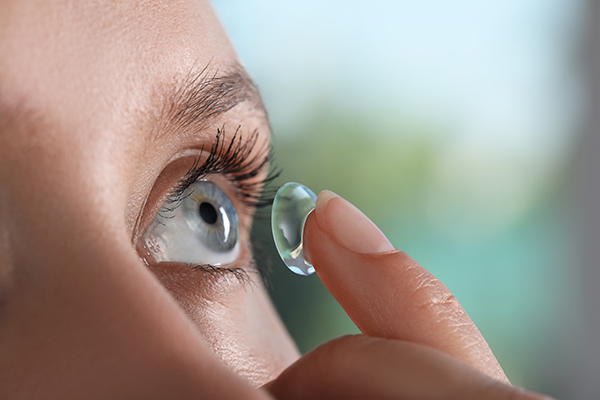To schedule an appointment in our Specialty Contact Lenses service, contact the Commonwealth office by calling (617) 262-2020. Please note that eye examination records and a history of dilation are required for scheduling an appointment. You have the option to schedule the comprehensive eye exam at NECO, or have your doctor fax records from a recent eye exam to (617) 236-6323.
NECO Center for Eye Care is one of New England’s most comprehensive medical contact lens clinics, offering a wide range of contact lens manufacturers and specializing in complex fittings for a wide array of ocular conditions. Our optometrists are national experts in medically necessary contact lenses and are at the forefront of the most recent advances in contact lens technology. They are uniquely qualified to diagnose, prescribe, custom fit, and educate patients on using specialized contact lenses. We treat patients needing complex visual correction, such as those with keratoconus, irregular corneas, irregular eyelid anatomy, traumatic corneal scarring, ocular surface disease, and high prescriptions.

Why Specialty Contact Lenses?
While traditional soft contacts work beautifully for many patients, certain eye conditions demand a more customized approach. Specialty contact lenses are specially designed to address irregular corneas, medical ocular conditions, and visual needs that conventional lenses cannot adequately correct. Below is a guide to when these lenses become necessary — and how NECO’s specialists provide solutions.
Conditions That May Require Specialty Contact Lenses
1. Keratoconus & Other Corneal Ectasias
When the cornea becomes irregularly shaped or thins over time, soft lenses often cannot provide clear, stable vision. Rigid gas-permeable (RGP), scleral, or hybrid lenses can vault or reshape the tear film over the cornea, delivering sharper vision and better comfort.
2. Post-Surgical Corneas
After corneal surgeries — such as LASIK, PRK, or corneal transplants — the corneal surface may be irregular or scarred. Standard lenses may not conform well. Specialty lenses can compensate for these irregularities and restore visual clarity.
3. High or Irregular Astigmatism
Some patients have significant or irregular astigmatic distortion that is not well-corrected by soft toric lenses. Specialty gas-permeable or hybrid lenses can precisely match the corneal contour and deliver crisp vision.
4. Corneal Scars, Pterygium, or Irregularities
In cases of trauma, infection, or ocular surface disease, scars or lesions can disrupt the corneal surface. Specialty lenses help “mask” these irregularities by creating a new, smooth refractive surface with the tear layer.
5. Severe Dry Eye or Ocular Surface Disease
When the eye’s surface is compromised by severe dry eye, ocular surface disease, or irregular tear dynamics, specialty lenses (especially scleral lenses) act as a fluid reservoir, protecting the cornea and promoting healing while improving comfort and vision.
6. Anisometropia or Monovision Needs
Some patients have very different prescriptions between their two eyes (anisometropia), or unique visual demands for monovision. Specialty contact lenses may offer more custom designs or geometries to handle extreme power differences.
7. Pediatric or Therapeutic Applications
In some pediatric eye conditions (such as infantile aphakia) or for therapeutic purposes (e.g. post-trauma, managing corneal disease), standard lenses may not work. Specialty designs can accommodate small eyes, anatomical differences, or treatment goals.
Why NECO for Specialty Lenses?
Tailored Fitting & Advanced Diagnostics
Our clinicians use corneal topography, wavefront mapping, and slit-lamp imaging to map each eye’s surface in detail, ensuring the most precise lens design.Wide Range of Options
We offer RGP, hybrid, scleral, and custom designs. Our team works with industry-leading lens manufacturers to secure the best match for your eyes.Ongoing Monitoring & Care
Specialty lenses require follow-up and adjustments. At NECO, we track your ocular health and lens performance over time to ensure comfort and safety.Collaborative, Patient-Centered Approach
We weigh your lifestyle, visual needs, and ocular health to pick not just any specialty lens, but the best one for you.
If you believe you (or someone you care for) may benefit from specialty contact lenses, we invite you to schedule a consultation. Our team can evaluate your eyes, explain your options, and guide you toward the best fit for comfort, clarity, and long-term eye health. We invite you to schedule an evaluation to explore your options.
Specialty Contact Lenses Providers





